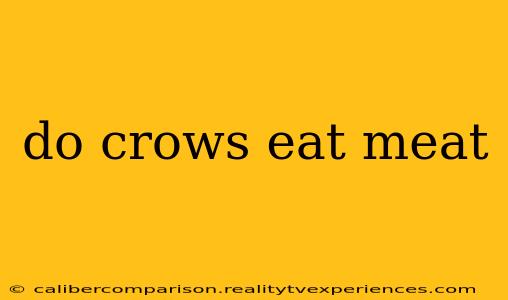Crows, those ubiquitous black birds often seen scavenging in urban and rural environments, are far more than just opportunistic feeders on discarded fries. While their omnivorous diet is well-known, their consumption of meat plays a significant role in their survival and ecosystem function. This article delves into the details of a crow's carnivorous habits, exploring what types of meat they eat, how they hunt, and their importance in the food chain.
What Kind of Meat Do Crows Eat?
The answer is surprisingly varied. Crows aren't picky eaters when it comes to meat. Their diet includes:
-
Carrion: This forms a large part of their meat consumption. Crows are efficient scavengers, readily consuming the carcasses of dead animals, from small rodents and insects to larger animals like birds and fish. This scavenging plays a crucial role in maintaining ecosystem cleanliness.
-
Insects: While technically invertebrates, many insects are high in protein and form a substantial part of a crow's diet. They actively hunt for insects like grasshoppers, beetles, and caterpillars, supplementing their carrion intake.
-
Small Animals: Crows aren't afraid to hunt live prey. They've been observed targeting small mammals like mice, voles, and even young rabbits. Their intelligence and cooperative hunting strategies enable them to take down surprisingly large prey for their size.
-
Eggs and Nestlings: Crows are known to raid the nests of other birds, consuming eggs and nestlings. This predatory behavior, while controversial to some, is a natural part of their survival strategy and a factor in the balance of avian populations.
-
Fish: Near water sources, crows are opportunistic feeders, seizing opportunities to snatch fish from shallow waters or consume dead fish washed ashore.
How Do Crows Hunt and Scavenge for Meat?
Crows demonstrate remarkable intelligence and adaptability in their hunting and scavenging:
-
Cooperative Hunting: Some crow species have been observed exhibiting cooperative hunting behaviors. They work together to flush out prey or overwhelm larger animals.
-
Tool Use: Crows are highly intelligent birds, capable of using tools to access food. They have been observed using sticks and pebbles to extract insects from crevices or break open shells.
-
Keen Observation: Crows possess exceptional eyesight and are keen observers of their environment. This allows them to quickly spot potential food sources, both carrion and live prey.
The Ecological Importance of Crows' Meat Consumption
The crow's carnivorous diet isn't just about survival; it's crucial to the health of the ecosystem:
-
Waste Management: By scavenging carrion, crows prevent the buildup of decaying matter, reducing the spread of disease and maintaining a cleaner environment.
-
Population Control: Their predation on small animals and insects helps to regulate the populations of these species, preventing imbalances within the ecosystem.
-
Nutrient Cycling: Crows' feeding habits contribute to nutrient cycling, as the nutrients from consumed animals are reintroduced into the environment through their waste.
Conclusion: More Than Meets the Eye
The next time you see a crow, remember that this seemingly commonplace bird plays a vital role in the ecosystem, efficiently managing waste and contributing to the balance of nature. Their carnivorous habits, far from being a simple aspect of their diet, are a key component of their survival and their contribution to the environment. Understanding their dietary preferences provides valuable insight into the complexity and interconnectedness of the natural world.

